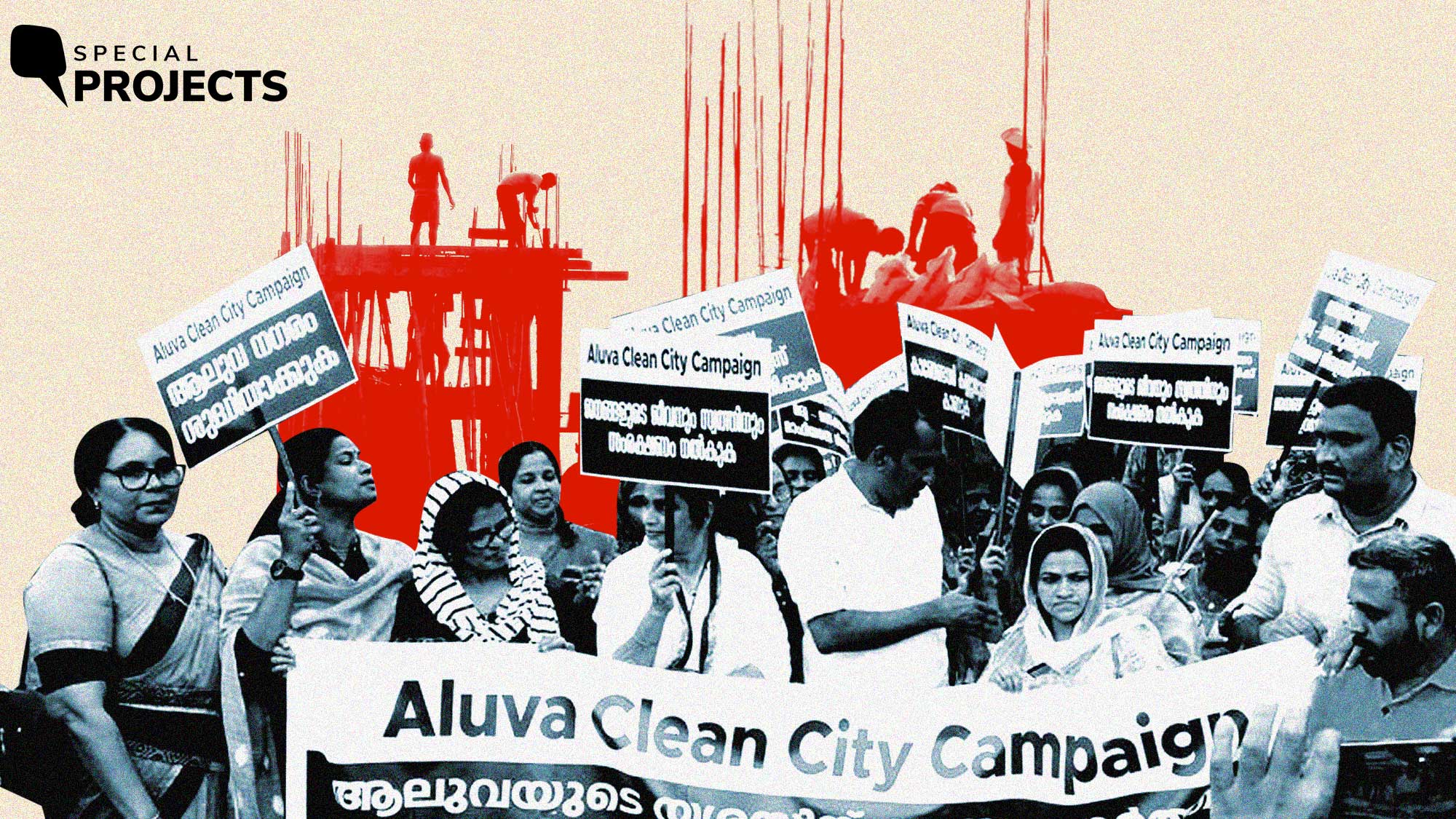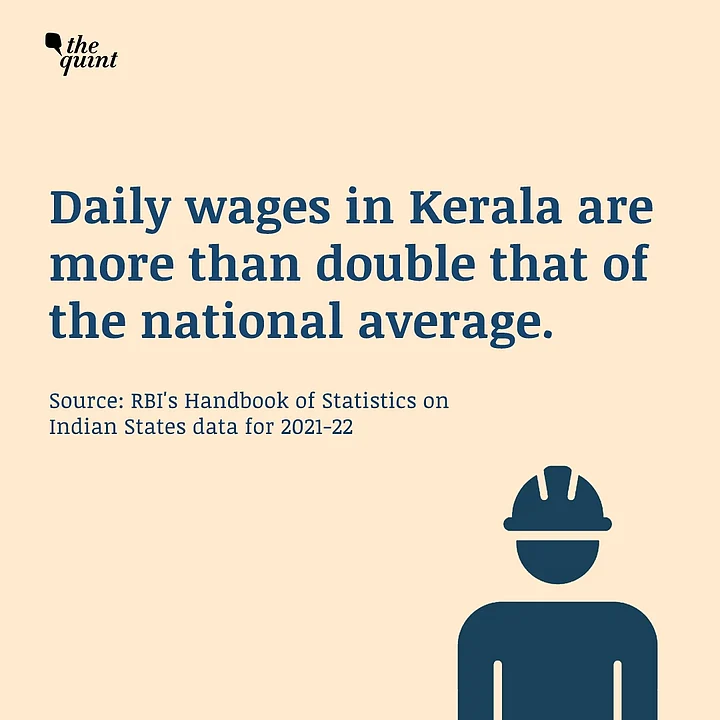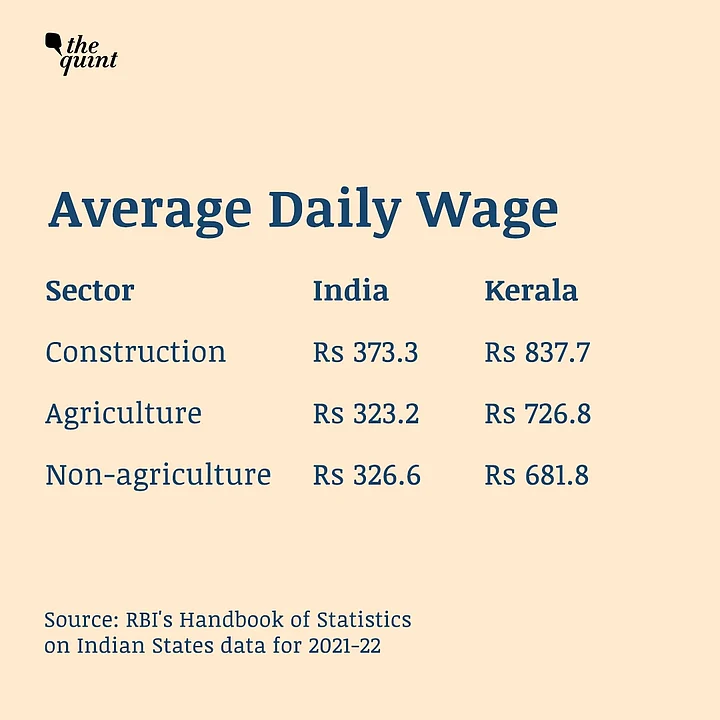(This story was originally published on 22 August. It has been republished from The Quint's archives after an Ernakulam sessions court awarded death penalty to Bihari migrant worker Asfaq Alam for the rape and murder of the five-year-old daughter of a migrant couple in Kerala's Aluva.)
It was 6 am and 61-year-old Akhtar (surname withheld to protect identity) had just stepped out to buy a packet of tea leaves from a nearby shop. Hailing from West Bengal's Burdwan district, Akhtar runs a makeshift canteen for migrant workers in Aluva in Kerala's Ernakulam district.
As he was walking back from the shop, two Malayali men allegedly stopped him. "They were asking me all sorts of questions – where I am from, what my name is, what I'm doing there. Then they asked me for my Aadhaar card. When I told them it was at home, they started shouting at me and threatening me," Akhtar alleges to The Quint.
"I have been living in Kerala for the past 28 years. Never have I ever been subjected to such behaviour," he adds.
Akhtar claims that this happened just about a week after a five-year-old Bihari girl was sexually assaulted and murdered, allegedly by a migrant worker from Bihar, Asfaq Alam. The girl was abducted outside her rented home in Aluva on 28 July – just a few houses from where Akhtar lives and works – and her body was found 4 km away, at the Aluva Market.
Alam, who has a criminal history, was arrested, but the incident has put the migrant worker community – or 'guest workers' as they are officially called by the state government – in Ernakulam under intense scrutiny, especially in the Aluva and Perumbavoor areas of the district, which are often referred to as 'mini north Indias'.
Just days after the incident, the police and excise departments of Kerala conducted raids at 50 'labour camps' in Aluva and Perumbavoor, and about 400 such locations all over the state.
Add to this the arbitrary moral policing, with citizen groups even launching a campaign to drive out migrant workers from public places for their alleged "illegal activities."
'We Love Kerala – but We're All Hindikaar to You'
"Kerala bohot achha hai (Kerala is very nice)," Nagma (surname withheld), a 35-year-old Assamese woman who came to the state just three months ago from Guwahati, tells The Quint. She works as a cook at Akhtar's canteen.
Kerala is indeed a haven for migrant workers from states like Bihar, Uttar Pradesh, Odisha, Assam, West Bengal, and Tamil Nadu, thanks to its high minimum wages.
- 01/02
(Photo: Kamran Akhter)

- 02/02
(Photo: Kamran Akhter)

According to a Kerala State Planning Board's 2021 study, the state was home to an estimated 31 lakh migrant workers in 2017-18 – with at least 10 lakh of them having migrated for a longer period, and the remaining being seasonal migrants (less than six months).
And this number is only expected to grow.
Most of these migrants have families in their home states. Of the long-term migrant workers in Kerala, only 5 percent live with their families – albeit in terrible living conditions.
The study found that 96 percent of the migrant workers live in shared accommodations, and about 39 percent live in temporary and kachha houses. The conditions of these houses, as well as their toilets, are poor, with about 3 percent of the migrant population resorting to open defecation.
"But when some people do something bad, all of us bear the brunt of it," Nagma adds.
Nagma says that after the Aluva incident, the police searched the canteen at least two-three times. "At least 40-50 policemen came, but they didn't find anything. This was in addition to the regular checks that happen every month," Akhtar adds.
Speaking to The Quint, Ernakulam Rural SP Vivek Kumar says the raids in localities where migrant workers reside are just "routine tasks" and that there is "nothing new or particular about them."
"This time, it was a bit intensified. We detected cases but the results are not different from what we usually get. A small quantity of drugs was seized. There were two-three immoral trafficking cases also. Some lodges were closed down due to this. We did not find anything out of the ordinary," he adds.
However, owing to regular police visits, Akhtar's canteen remains shut every now and then. "Our customers don't come as much as they are afraid to even step out. They wake up early, go to work, and come back home. They are scared that if they step out, locals might abuse them," he says.
Nagma, who used to earn Rs 500 every day, says she would move out of the area soon due to a lack of work.
On average, a migrant worker earns Rs 16,000 per month, of which they save about Rs 4,000. The study estimated that annually, about Rs 7.5 billion goes out of Kerala as remittance to other states.
"I will do whatever work that comes my way, I can work at restaurants or homes, do cooking and cleaning. I have to ensure that my daughter gets a good education back in Assam. That's why I am here."Nagma
Meanwhile, Akhtar, who has worked in different parts of Kerala since the 1990s, says he is hopeful of finding a different job if push comes to shove.
"Since the incident, a lot of people have left for their homes or to other places because they are scared. Those who commit the crime should get punished, yes. But should those who did not do anything be punished as well?"Akhtar
"For you people, we are all the same. We are bhais or Bengalis or Hindikaar. I am a Bengali, but I am also being blamed. If we didn't do anything wrong, then why are my people being targeted?" he asks.
'We Can't Afford To Get Kicked Out'
Some 22 km from Aluva, in a town called Tripunithura, 67-year-old Vijayan (surname withheld) is perturbed. He owns a lodging facility for migrant workers in his neighbourhood – and about 15 male workers, who are mostly from Odisha, stay there at any given point in time.
After the minor's death, Vijayan received a disturbing call from one of his neighbours. "They [the neighbour] told me that they would complain to the police about my tenants as they 'come and go' out of my building at odd times. They are workers, sometimes they have to work till late at night, and sometimes they have to wake up early and go to work. What is so wrong if they step out?" he asks.
Vijayan says he did not want any trouble, so he approached the police with their tenants' details even before someone could complain.
"It was not necessary. But I don't want any trouble. I have warned my tenants against drinking or smoking. If they behave, there won't be any issues."
He tells The Quint that he is also planning to install a CCTV camera outside the building, so he can "watch out for any trouble."
Dilip (surname withheld), a masonry worker who lives in the same building, adds:
"We came to Kerala to work and make money. I have two children back home in Odisha. We go out for work in the morning, come back home, cook food, eat, and sleep. This is our life."
"But after we heard about the incident, we decided to be extra careful. We don't even stand outside the door sometimes, fearing that someone might complain. If we lose this accommodation, it will be hard to find another one at this price," he says.
The Aluva 'Clean' City Campaign
Such policing of migrant workers has even evolved into self-assigned vigilantism in some parts of Ernakulam.
When The Quint was on the ground visiting a locality where migrant workers reside in Aluva, this reporter was stopped by a 30-something man who lives in the area.
"Where are you going? Are you going to where the bhais live? Did you not hear what happened to that five-year-old girl? Do you want to end up the same way?" he asked.
After these remarks, he insisted that he accompanies this reporter to the migrant workers' homes.
"If we could move out of this area, we would. This whole area was ours, now there are a lot of bhais living here. My sister and I don't work here. Only my mother lives here. But now, looking at the condition of this area, I don't want to leave her alone. What if they do something to her?" he said.
The man, who did not wish to be named, however, told The Quint that for the past few days, "the bhais are all sitting inside, scared. The streets of Aluva are ‘clean’ now because of the Aluva Clean City Campaign."
"The Aluva Clean City Campaign was launched the day after the girl's body was found – and it's a campaign that is led by our mothers and sisters. It started as a WhatsApp group," Anwar Aluva, a social worker and the vice president of the campaign, tells The Quint.
The group, comprising 30-40 women and about 10 men from Aluva, have been patrolling the streets at night wielding sticks, breaking up migrant workers congregating in public spaces and "engaging in illegal activities," Anwar says.
"The situation in Aluva has been bad for a while. We see people from other states congregating, having drugs and alcohol in public spaces. There are also a lot of prostitutes and transgenders (people). They are misguiding our youth, and our women and children can't walk through these roads anymore."Anwar Aluva
He adds that an "incident like this could happen to our children too."
"We are not against migrant workers. There are good people too. But how will we identify who is good and who is bad? We are scared to send our children out. We don't know how these people will behave," he adds.
Anwar claims that "now, when they [migrant workers] see us coming, they run away. Some people might accuse us of moral policing, but we want our women and daughters to be safe. Even the police are supporting us."
However, the Ernakulam Rural SP tells The Quint that "there is no support from our side at all."
"In fact, we have registered a case against them. There was an instance of moral policing, in which one person – a local – had a complaint saying that he was unnecessarily taken to task by this group of vigilantes and hooligans."Vivek Kumar, Ernakulam Rural SP
A case was registered against the members of the Aluva Clean City Campaign under sections 283 (danger or obstruction in a public way or line of navigation), 143 (unlawful assembly), and 147 (rioting) of the Indian Penal Code (IPC).
But the fact remains that the 'criminalisation' of migrant workers isn't new or uncommon in Kerala. Whenever a crime involving a migrant worker gets reported, it intensifies the existing ire against interstate migrant labourers, most of whom are from marginalised classes and castes.
The death of a 29-year-old law student in Perumbavoor in 2016 and the subsequent arrest and conviction of a migrant worker for the crime was one such catalyst.
However, there is no empirical evidence to suggest that migrant workers have contributed to a rise in crime rate, says Rejimon Kuttappan, a migrant rights activist from Kerala.
"Most of the migrant workers who come here are from marginalised communities. As a society, Malayalis will let them work in their homes, but when it comes to bringing them close to their families, say through marriage, that's a complete no-no. It shows what a deeply casteist society ours is," alleges Kuttappan.
(This is Part 1 of a two-part series exploring the lives of migrant workers in Kerala in light of the rape and murder of a five-year-old Bihari girl allegedly by a migrant worker living in Aluva, located in the state's Ernakulam district.)


